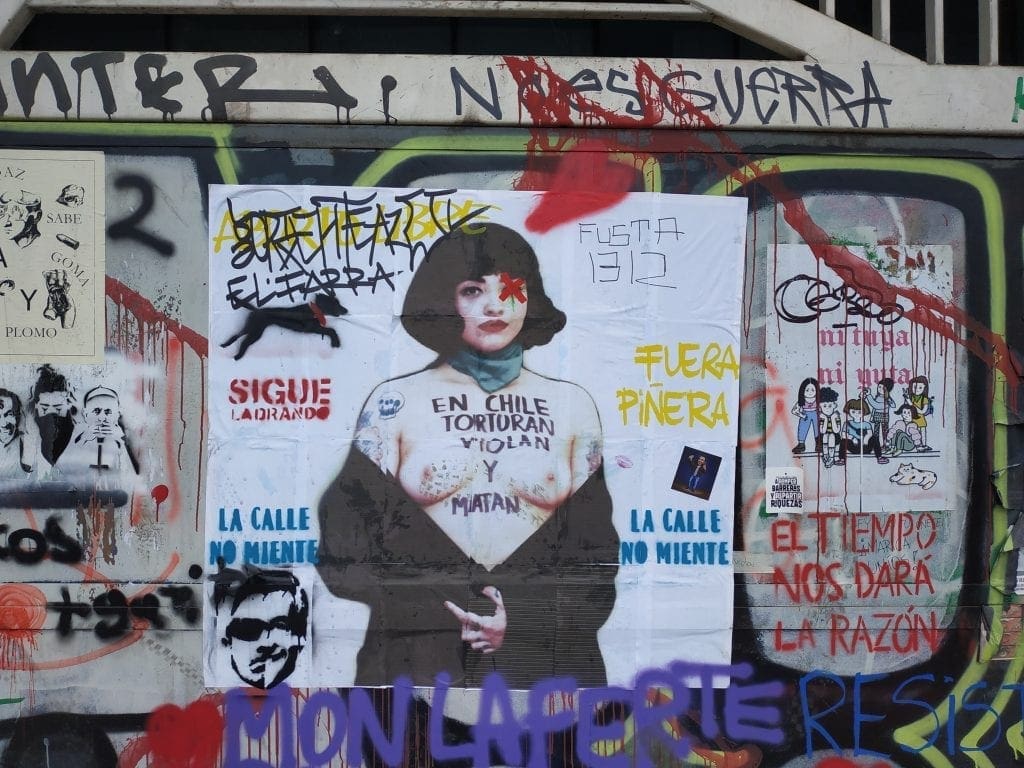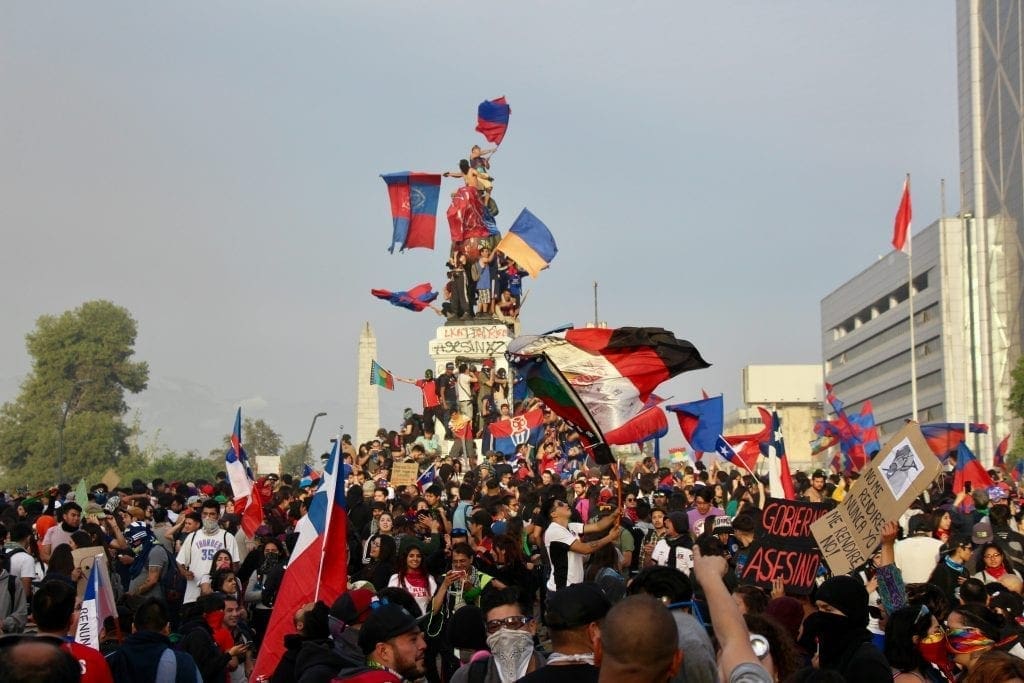On 18 October 2019, the social revolution exploded onto Chile’s streets. Inequality, a high cost of living, tuition fees, pensions, the management of resources… Demands across the board called into question the neoliberal model and the constitution inherited from the Pinochet dictatorship (1973-1990). On 25 October 2020, Chileans will vote on changes to this constitution in a referendum. The political battle has been launched, in a context in which Coronavirus has slowed mobilisation and exacerbated social inequalities.
A few weeks before the decisive vote, what role has music played in this movement that has seized upon the arts to bring about its revolution?
The expression of a “collective musical memory”
The social movement has connected generations of artists, from the 1960s to the present day, creating a “collective musical memory”, according to David Ponce, a Chilean journalist specialising in popular music. All genres are present, from punk to cumbia, via cueca, rock and pop.
The demonstrators have revived great anthems such as “El derecho de vivir en paz” (1971) by Víctor Jara, a martyr under the dictatorship, picked up on by a collective of guitarists during the demonstration that brought together more than a million people in Santiago on 25 October 2019.
Mil guitarras para Víctor Jara convoco a cantar en Biblioteca Nacional!!
Geplaatst door Pato Zura op Zaterdag 26 oktober 2019
Similarly, the line “the united people will never be defeated” has been chanted spontaneously here and there. “El pueblo unido jamás será vencido” (1970, Quilapayún, Inti-Illimani) retains all its power of action, as evidenced by this memorable performance by Inti-Illimani and the masses gathered on 13 December in the capital.
Groups opposed to the dictatorship also inspired the gathering, such as Los Prisioneros, with the Chilean rock standard “El baile de los que sobran“ (1986) or Sol y Lluvia, with a live update to the iconic “Adiós General” written in 1990 when the dictatorship was at an end. The crowd took up the chorus “Adiós Carnaval / Adiós General”, but this time to say goodbye to “Sebastián”, the current president.
The soundtrack is also rich in contemporary titles, which, with their critical tone, helped to anticipate the crisis, like “Millones” (2009) by Camila Moreno, a committed Nueva trova feminist. She lashed out at the power held by big companies with a cry of “They want (…) millions of souls in their huge account”. Ana Tijoux, the leading light of political rap, composed “Shock” in support of the 2011 student movement with these words against neoliberalism: “We won’t allow your doctrine of shock anymore!” In 2012, the rapper Portavoz told the everyday story of “another Chile” struck by poverty and inequality in his “El otro Chile”.
Musical creation rises up
The social explosion has inspired countless creations that showcase the strength of the popular movement and speak out against the violent repression of law enforcement agencies.
“Social explosions are always a form of inspiration (…) When you see a people rising up to demand justice, there’s nothing more beautiful and inspiring for those of us who are creative”, says Ana Tijoux. The rapper says her role in the movement is to be “sensitive to what’s going on (…) following the rhythm by keeping my eyes open and perhaps being mindful of the tones of the social temperature”. A commitment illustrated by her explosive “Cacerolazo”, which pays tribute to the noise made by people banging pots and pans in protest and provides a glimpse of the violence in words and images.
In November, the indie-pop musician Álex Anwandter released the eloquent “Paco Vampiro” (“vampire cop”) with the scathing lyrics “Vampire cop, you’re thirsty for blood”, while Nano Stern pays an intimate tribute to 22-year-old Gustavo Gatica, who lost his eyesight after being injured by police during a demonstration. He echoes Gustavo’s words “I gave away my eyes so people would wake up”.
The electronic community has also mobilised. The netlabel Modismo has released a compilation on the Bandcamp platform in aid of the hundreds of eye injuries. These songs sample the noise of the street, allowing us to experience the different sounds and emotional states of the crisis, the atmosphere heavy but also combative.
The street, a privileged stage for artistic creation
In politics and the arts, the “people”, as an entity united in revolution, have played the leading role. In a movement marked by a “bottom up” politics, the public space has welcomed collective and multifaceted artistic creation: concerts, spontaneous songs, graffiti, posters, signs, dance, installations…

Poster pasted on a wall in Santiago - © photo : Agathe Petit
“Neither politics nor culture have manifested in a formal way: they have played a part, of course, and were expressed loudly during the demonstrations, but by the voices of individuals, without parties, without leaders, without representatives, without spokespeople”, explains David Ponce. There are plenty of examples of concerts formalised by a stage, such as the one performed by Inti-Illimani mentioned above, but they did not result in an official political intervention. As far as Ponce is concerned, music is expressed first and foremost as a medium, putting the “people” and their free use of this “shared and collective language” at the forefront.
While the streets may have been the privileged arena of political and musical expression, one of the most salient examples is the Las Tesis feminist collective and their performance of “A Rapist in Your Path”. Striking lyrics, a heady electro beat, simple choreography and blindfolds… In November, Las Tesis offered a powerful tool to incite female anger against gender violence. In the streets of Chile and internationally, women have taken possession of the song, translated it and adapted it to their own needs. This is a powerful example of how the use of music can create a collective, unified in its demands, and extend its reach. A performance that marked the Chilean social awakening of 2019 and is sure to inspire future movements in Chile and beyond.
Tank you to Ana Tijoux and David Ponce for their enlightening statements, to MiNiMuM ans Grégoire Bouquet for their precious help, and to Jearim Contreras for his proofreading and advice about translation.


